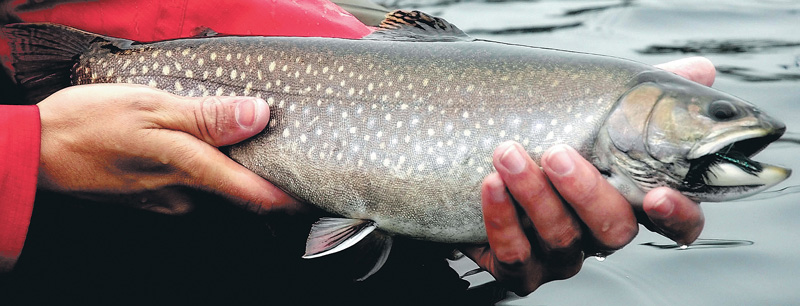Labor Day weekend, I forded Sourdnahunk Stream on the east side of Baxter Park with my 5-year-old grandson Vishal Mellor on my back. Then I placed him on the ground, and we hiked a few hundreds yards to one of my favorite pools, hoping to catch some native brook trout.
Because he hasn’t yet learned to cast flies, I did the casting, then handed the fly rod to Vishal. He immediately began reeling, hooked the fish, and hauled them in, as we both whooped it up.
There are no sweeter words than, “I’ve got another one, Grampy!”
I took the hooks out of the trout, handed the fish to Vishal, and he carefully released them back into the stream. We caught 24 trout in an hour and a half of the most fun you can have with a grandchild.
Trout number 21 was a whopper. As soon as Vishal released the fish, I made another cast, only to hear him exuberantly exclaim, “We’re both very happy!” Boy, he got that right!
Maine has 97 percent of the country’s remaining wild and native brook trout waters. They are the love of my angling life and the state’s signature fish, but we’re not doing enough to protect them. In fact, we’ve done a lot wrong over the last 150 years, stocking species (both legally and illegally) that compete with and challenge brook trout all over the state.
Invasive nonnative fish have changed everything for Maine’s brook trout and its anglers.
Very few seem concerned that smallmouth bass have become our state’s No. 1 fishery. Twice as many bass are caught each year in Maine than native brook trout, an astonishing fact.
As fisheries biologist Merry Gallagher recently noted, “The wild trout waters are a huge concern.” Biologist Nels Kramer added, “Unfortunately, every week, there are reports of new introductions.”
A battle is brewing over new restrictions on the use of live fish as bait in brook trout waters that have not been stocked in at least 25 years. Using live fish as bait offers the opportunity for some of those bait fish species to become established in those waters, where they compete with and crowd out brook trout. Smelts — the most popular live bait species — are a serious threat to brookies.
Legislation proposed by the Sportsman’s Alliance of Maine, when I served the organization as executive director, and enacted by the Legislature, protected brook trout in about 300 ponds that have never been stocked. Both stocking and the use of live fish as bait are prohibited on those ponds.
Now the debate has moved to a second group of brook trout ponds that haven’t been stocked in at least 25 years. Some were stocked only once.
For me, there should be no debate. We must do everything we can to save the state’s remaining wild and native brookies. Shame on us if we don’t.
There’s a move afoot to remove the major lakes from this list and focus only on those smaller waters where there will be little if any opposition to banning live fish as bait.
That easy step should be taken immediately.
The bigger debate, however, should continue: how much value do we place on our wild and native brook trout, and do we have an obligation to protect them for future generations? Frankly, for 150 years, we have failed these colorful beauties.
Surprisingly, it’s taken a major initiative over the last two years, led by Maine Audubon and the Maine Chapter of Trout Unlimited, to survey 372 remote ponds to find out if they have even have native brook trout. Those ponds have never been surveyed, ever!
And while the current debate focuses on the use of live fish as bait, we must step this discussion up to address other needs: staff, research, engaging and educating anglers and habitat protection and enhancement.
Perhaps most importantly, in waters where we still have native and wild brook trout and no nonnative species, we must be ready to react immediately with all available means to remove illegally introduced fish from those waters.
In my ideal brook trout world, Maine’s Department of Inland Fisheries and Wildlife would survey every wild and native brook trout water every year, to keep a close eye on them and to allow early detection of any new species introduced there.
We must do this so that a hundred years from now, some other grandfather can hear his grandson or granddaughter exclaim, while releasing a gorgeous native Maine brook trout, “We’re both very happy!”
George Smith is a writer and TV talk show host. He can be reached at 34 Blake Hill Road, Mount Vernon 04352, or georgesmithmaine@gmail.com. Read more of Smith’s writings at www.georgesmithmaine.com.
Send questions/comments to the editors.



Success. Please wait for the page to reload. If the page does not reload within 5 seconds, please refresh the page.
Enter your email and password to access comments.
Hi, to comment on stories you must . This profile is in addition to your subscription and website login.
Already have a commenting profile? .
Invalid username/password.
Please check your email to confirm and complete your registration.
Only subscribers are eligible to post comments. Please subscribe or login first for digital access. Here’s why.
Use the form below to reset your password. When you've submitted your account email, we will send an email with a reset code.